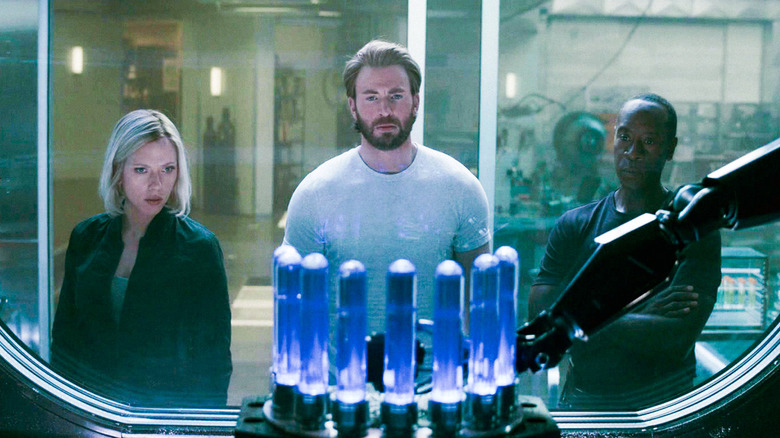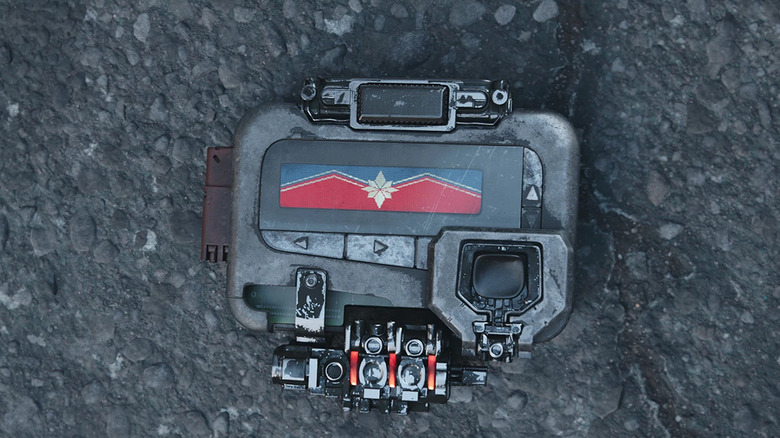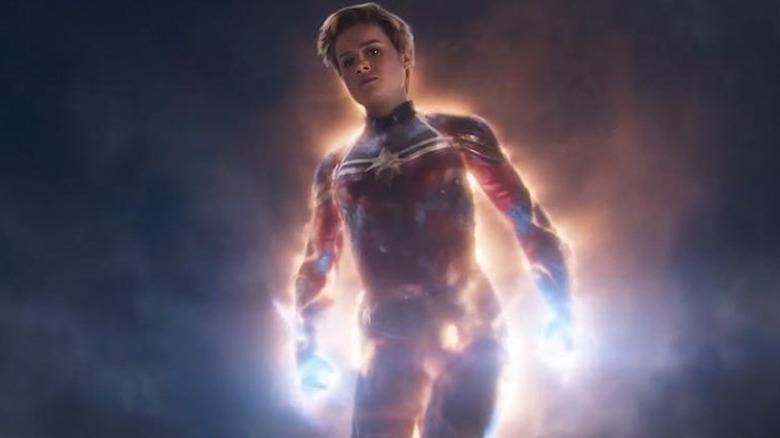The 'Missing Narrative' That Would've Bridged Captain Marvel And Avengers: Endgame
Anthony and Joe Russo's 2018 superhero blockbuster "Avengers: Infinity War" was the 19th film in the long-running Marvel Cinematic Universe, and had an ending so beautifully bleak that it could have served as the proper ending to the entire series.
Since the start of the MCU in 2008, Earth had become suddenly and suspiciously lousy with superheroes; the android Vision (Paul Bettany) made note of this astonishing new change to Earth in 2016's "Captain America: Civil War." What happened to the universe that hundreds of superheroes suddenly came into being?
And, as we all know, wherever there are superheroes, there are planet-wide cataclysms. It's almost as if superheroes are largely responsible for creating the mayhem they so often fight. What a fitting end to a superhero story, then, that they should attract a destructive threat larger than they could handle. Thanos (Josh Brolin) was concerned with overpopulation and, approaching the problem with a warlord's mindset, aimed to eradicate half the population of the universe. Dozens of Avengers, also hung up on military thinking, aimed to fight and attack and kill and punch and shoot weapons to stop him. Violent superheroes, as they always do, attracted a violent foe — only this time, the heroes would be overwhelmed.
Thanos, using magical stones, was successful in his quest and killed untold quintillions in a single instant. He then retires peacefully to a farm. The MCU is hoisted by its own petard. How useless to be a superhero. Our devotion to fighting and violence will only ever end in oblivion. What a beautiful ending it would have been. Sadly, there was a post-credits stinger to reassure audiences that the damage would be undone.
On the commentary track for "Avengers: Endgame," co-director Joe Russo sheds more light on the pager seen at the end of "Infinity War," and where Captain Marvel was throughout "Endgame."
Undoing all that lovely death
At the very end of "Avengers: Infinity War," after all the credits have played, Nick Fury (Samuel L. Jackson) hits a button on a pager just as he melts into ash. The pager displays a yellow, eight-pointed star on a red and blue field. At the time, savvy Marvel fans recognized this as the symbol of Captain Marvel (Brie Larson), aka Carol Danvers, a character who would get her own prequel movie the following year.
A mid-credits scene for "Captain Marvel" continued the narrative. The remaining Avengers are seen investigating the mysterious pager, only to have the mystery quickly solved when Carol Danvers herself returned to Earth to respond to Fury's distress call.
The next time we saw her was at the start of "Avengers: Endgame," where she arrived just in time to save Iron Man (Robert Downey, Jr.) from dying in a derelict craft drifting in deep space. From the way "Endgame" is directed, it appears that Captain Marvel happened upon Iron Man by chance and decided to save him out of the goodness of her heart. It especially appeared that way to "Endgame" audience members who hadn't seen "Captain Marvel" (or left when the credits started rolling). But Russo explains that there were unfilmed parts of the story, and that Carol finding Iron Man was no accident:
"The missing narrative, of course, is that she came to Earth, met the Avengers, was brought up to speed on what was happening, and that there's some sort of homing beacon on that ship that she tracks, and brings the two of them back to Earth."
Easy peasy. Captain Marvel got the page, went to Earth, the Earthbound Avengers let her know that Iron Man was lost in space, and Rocket (the only Guardian of the Galaxy who remained un-dusted) tipped her off to the Benatar's homing beacon.
You and the Cap'n make it happen
The reappearance of Captain Marvel was set up to be, of course, a grand solution to the eradication of half the universe. In her own film, Captain Marvel was said to be immensely powerful, what with the whole punching-through-spaceships thing. She arrived in a burst of light and saved Iron Man from space. Surely she was then going to do something massively exciting to undo the damage, right?
As it so happens, no. Captain Marvel spent the bulk of the film off-world, helping other planets. She wouldn't return until the climactic final battle where she punches a hole through a spaceship. She is not the single power that brings the Avengers together, nor does she deal any kind of decisive death blow to Thanos or his army (apart from the hole in his spaceship). Other characters do those things.
One of the reasons for this, according to co-writer Christopher Markus, is that he and fellow screenwriter Stephen McFeely "didn't have much to go on" when it came to the character of Carol Danvers. Because it was shot back-to-back with "Avengers: Infinity War," "Endgame" wrapped filming before "Captain Marvel" had started production. When Markus and McFeely were putting the screenplay together, "They had cast her and that was it."
So the timeline is thus: Nick Fury pages Captain Marvel. She arrives on Earth and gets the skinny about which superheroes have died. She uses a homing beacon to get Iron Man and returns him to Earth about 22 days later. She didn't really help out with the Thanos thing because, well, Earth ain't the only planet that needs a superhero. It's amusing to think that Earth's Mightiest Heroes united to stop a universe-killing cataclysm, and Captain Marvel still had bigger fish to fry.


